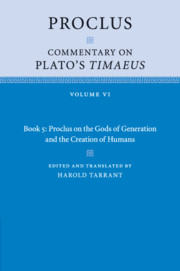Introduction to Book 5
Published online by Cambridge University Press: 01 July 2017
Summary
THE INTEGRITY AND STRUCTURE OF BOOK 5
As in all previous volumes Proclus offers an extended discussion of his text of Plato's Timaeus, which is the same in most of its details as our text. Since it is most important that a Neoplatonic commentary should be able to relate everything in a Platonic dialogue to a single goal or purpose (skopos), Proclus does not choose to leave out any of the material, but to relate everything to his vision of what the dialogue is trying to achieve. The text that comes down to us contains each chunk of Platonic text, ranging from a couple of words (if very important for Proclus’ interpretation) to several lines, followed most commonly by some more general interpretation followed by further comments on the little details of the language. This division, into what are called the theoria and the lexis is more obvious in those commentaries that spring directly from classroom activities, often as recorded by a note-taker, but traces of it remain in Proclus’ work, which is no doubt meant to be of a longer-lasting nature and to be read by generations of readers, for it was seen by Proclus as one of his major achievements (Marinus, VProc. 38).
Unlike the two previous books, Book 5 of Proclus’ Timaeus Commentary is no longer governed by any strong structural influence other than the text of the Timaeus itself, of which it continues to take note of every word that Plato wrote. It covers 40e5–44d2, a little less than four Stephanus pages, fractionally more than Book 4 (37c6–40e4). There is some question about whether this book is finished, and for two reasons. First, Philoponus (Aet. p. 364 Rabe) cites several Proclan lines that relate to Tim. 50c and gives their context as ‘the fifth logos of the exegetic [discussions] on the Timaeus’. Citation of ancient book numbers is often muddled in the early tradition; but one may in any case question whether the logoi of the work are supposed to be identical with the books that have come down to us, and, if not, how (if at all) they relate to what we have. Second, the recensio vulgata writes at the end: ‘Proclus’ [work] on the Timaeus has been discovered as far as what lies before us; it is unclear whether he also interpreted what follows.’
- Type
- Chapter
- Information
- Proclus: Commentary on Plato's Timaeus , pp. 1 - 34Publisher: Cambridge University PressPrint publication year: 2017



